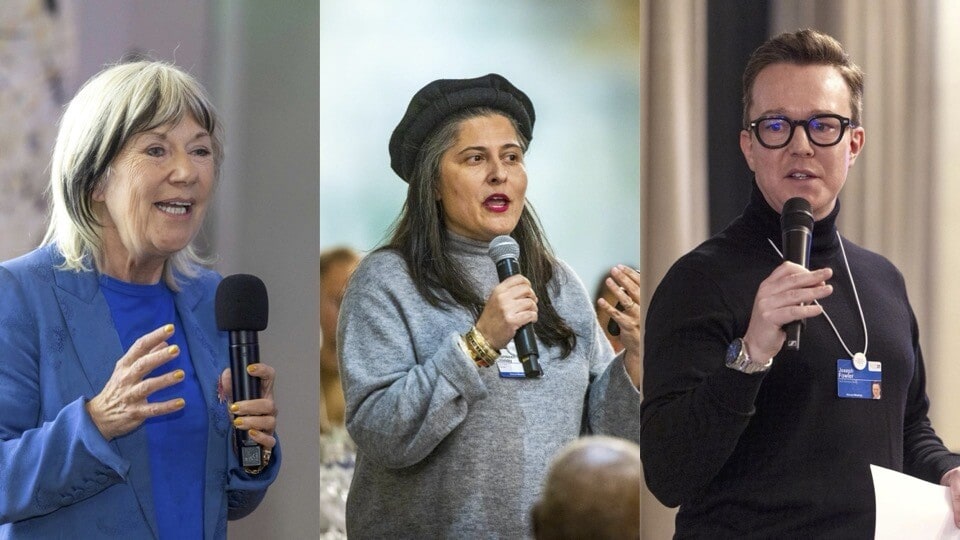'Parasite' is the first non-English language film to win Best Picture at the Oscars

Bong Joon Ho and Han Jin Won proudly display their Oscar statues for their film "Parasite". Image: VIA REUTERS
South Korean social media erupted in celebration on Monday after the dark comedy “Parasite” became the first non-English language movie to win the Best Picture award, already having netted three other Oscars in a historic first for the country.
Director Bong Joon-ho’s “Parasite” vaulted over what he once called the “one-inch tall barrier of subtitles” to capture international attention like no previous South Korean movie.
Bong’s win for Best Original Screenplay was the first Oscar for South Korea’s large film industry.

But as the night continued, the film also came out on top of increasingly prestigious categories, including International Feature Film award, Best Director for Bong, and the top award, Best Picture.
“I’m ready to drink tonight,” Bong joked, after thanking the cast and staff during his acceptance speech for the International Feature Film award.
Executive producer Kwak Sin-ae said she was “speechless” after the film won Best Picture.

“Parasite” had also snagged nominations for best production design and best film editing, and had already collected several other international film awards.
A satirical take on the vast gap between the rich and poor in South Korea, the movie came as South Korea grapples with the divide between “dirt spoons” - those born to low-income families who have all but given up on social mobility - and “gold spoons,” as those from better-off families are known.
LANGUAGE BARRIERS FALLING
Although South Korea’s film industry is one of the largest in the world, the Korean-language “Parasite” made unprecedented waves in international markets.

After the nominations were announced in January, Bong said he saw it as a sign that language is no longer a stumbling block for global success.
“I was so proud as a Korean to hear that a South Korean film defeated so many famous foreign films,” said Chung Su-yoon, a Seoul resident who watched “Parasite” just two hours before the Oscars.
Pop culture critic Kim Hern-sik said the deeper messages of “Parasite” allowed it to resonate with people around the world.
“Just like BTS had a popular appeal by casting the problems the youth go through everywhere in the world, ‘Parasite’ gained global understanding by demonstrating the issue of the gap between the rich and poor,” Kim said, referring to the K-pop group that has found wide success in the United States and around the world despite Korean-language lyrics.

One clip making the rounds on South Korean social media mocked a reporter who asked Bong why he shot the film in Korean.
“She should’ve asked Scorsese or Tarantino why they shot their own movies in English,” one commenter said, referencing other directors who were nominated.
Another popular clip on South Korean social media was a slow-motion shot of the cast enjoying the night on the red carpet, cheering the stars and wishing them the best of luck.
U.S. Ambassador to South Korea Harry Harris tweeted, “we are doing a watch party at the embassy eating jjapaguri”, referring to the noodle dish the rich family enjoys in the movie.
“HISTORIC MOMENT”
The movie’s distributor, CJ ENM, said it was a “historic moment” that will go down in Korean film history.

“Over the past year, we have realized that the status of Korean films has dramatically increased thanks to ‘Parasite,’” the company said in a statement.
South Korean President Moon Jae-in said the film’s cast and crew helped instil “pride and courage in our people as we come together to weather difficulties.”
“I am very pleased to see a Korean film shoulder to shoulder with those of other countries,” he added.

Hashtags Parasite and DirectorBongJoonho were the most trending on Twitter South Korea, while the movie name was the most searched on the local Naver web portal after the victories.
Some South Koreans called the win a “national celebration”.
“Global audiences will watch the movie and say that ‘South Korea can also do it,’” said Kim Chan-dong, a pastor who watched “Parasite” on its second day in theatres. “The movie frankly portrayed the story of people in hardships, arousing deep sympathy from people.”
Don't miss any update on this topic
Create a free account and access your personalized content collection with our latest publications and analyses.
License and Republishing
World Economic Forum articles may be republished in accordance with the Creative Commons Attribution-NonCommercial-NoDerivatives 4.0 International Public License, and in accordance with our Terms of Use.
The views expressed in this article are those of the author alone and not the World Economic Forum.
Stay up to date:
Republic of Korea
Related topics:
Forum Stories newsletter
Bringing you weekly curated insights and analysis on the global issues that matter.
More on Arts and CultureSee all
Elena Raevskikh and Giovanna Di Mauro
October 22, 2025






